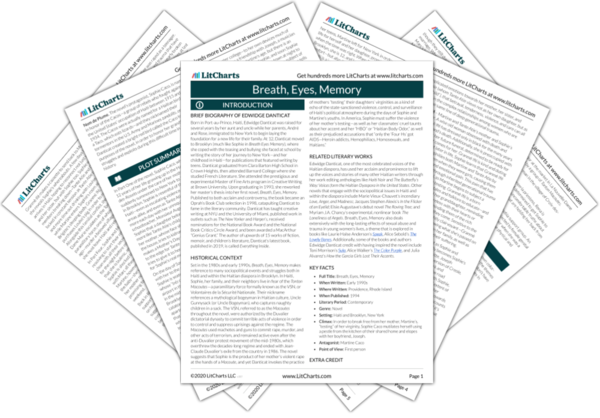Sophie and Martine’s night terrors represent the haunting, persistent nature of violent trauma. When Sophie arrives in New York to start a new life in America with her mother, Martine, she realizes on her first night in her mother’s Brooklyn apartment that Martine suffers from debilitating night terrors which leave her screaming, thrashing, kicking, and biting in her sleep. Martine comes to rely on Sophie to wake her from the dreams, calling Sophie a life-saver and thanking her for always sticking close by. Though Martine doesn’t tell Sophie why she’s plagued by such dreams at first, Sophie eventually learns that she was the product of rape, and that Martine vividly relives the violent assault at the hands of a Haitian paramilitary, or Tonton Macoute, every night of her life. Martine’s night terrors aren’t just hers once Sophie arrives—Sophie takes it upon herself to comfort her mother each night, and Sophie’s sleep, too, is affected by the nightmares; as she grows older, she admits to often having bad dreams herself. Both women’s dreams and night terrors, then, abstractly symbolize the novel’s theme of mothers, daughters, and generational trauma—and, more literally, they represent the lingering physical and psychological effects of violence, especially violence of a sexual nature. Martine’s night terrors eventually grow so bad that they are, Danticat suggests, a large part of the reason why she takes her own life. Sophie worries that her infant daughter, Brigitte, will inherit her and her mother’s insomnia, but is relieved that Brigitte is, for the most part, a good sleeper. Danticat further symbolically ties peaceful sleep to mothers, daughters, and trauma when Joseph tells Sophie, after she leaves for Brooklyn and later Haiti to bury Martine, that Brigitte has become a cranky sleeper in her mother’s absence, suggesting that there is a link between peaceful sleep and an absence of trauma, violence, or pain inflicted on a child by its mother.
Dreams and Night Terrors Quotes in Breath, Eyes, Memory
“Ou byen? Are you all right?” I asked her.
She shook her head yes.
“It is the night,” she said. “Sometimes, I see horrible visions in my sleep. […] Don’t worry, it will pass,” she said, avoiding my eye. “I will be fine. I always am. The nightmares, they come and go.”
After Joseph and I got married, all through the first year I had suicidal thoughts. Some nights I woke up in a cold sweat wondering if my mother’s anxiety was somehow hereditary or if it was something that I had “caught” from living with her. Her nightmares had somehow become my own. […] I looked back at my daughter, who was sleeping peacefully. […] The fact that she could sleep meant that she had no nightmares, and maybe, would never become a frightened insomniac like my mother and me.
“Your mother never gave him a face. That’s why he’s a shadow. That’s why he can control her. I’m not surprised she’s having nightmares. […] You and your mother should both go there again and see that you can walk away from it. Even if you can never face the man who is your father, there are things that you can say to the spot where it happened. I think you’ll be free once you have your confrontation. There will be no more ghosts.”












